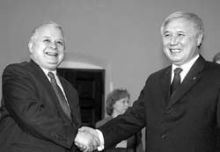The project to extend the Odesa-Brody oil pipeline to the Polish city of Plock might be implemented within three years. After this, the pipeline will be able to transport Caspian oil to Europe. This is the view of Ukrainian and Polish negotiators today.
The ball may start rolling this year. “2006 is going to bring on possibilities to implement this project,” Poland’s Prime Minister Kazimierz Marcynkiewicz told a press conference in Warsaw, which was attended by Prime Minister Yuriy Yekhanurov of Ukraine. The Odesa-Brody pipeline is now working in reverse mode, serving the interests of Russia, which is using it to pump its oil in the European direction (tankers carry the fuel from Odesa through the Turkish straits of Bosphorus and Dardanelles). But this may be halted. “There are legal possibilities for terminating the reverse mode, and there is a mechanism for solving this problem,” Yekhanurov reassured the Poles. On his part, the Polish prime minister also promised that “concrete actions will be undertaken within the next two months to make this project self-supporting.” According to the state-run oil company Nafta Polska, the project will be commercially viable when the pipeline brings Poland at least 20 million tons of oil a year and transports at least 40 million tons a year, which will help attract such companies as Chevron or BP, which extract oil in Kazakhstan and Azerbaijan.
It may be assumed that Poland’s energy security depends to a large extent on the owners and trouble-free operations of the Ukrainian gas transportation system. In this connection Yekhanurov was correct in saying that Ukraine views Poland as a prospective participant in the international consortium that will be set up to use Ukrainian gas pipelines for the transit of gas to Europe. The prime ministers of Ukraine and Poland signed a joint declaration on their governments’ support for the Odesa-Brody-Plock oil pipeline project. Oleksandr Todiychuk, chairman of Ukrtransnafta, told journalists that the main idea of this document is that “the two governments are signaling all participants that the project is practically beginning to be implemented.” Ukrtransnafta’s press service told The Day that the two sides are beginning to draw up a comprehensive Ukrainian-Polish agreement that will finally settle the question of intergovernmental cooperation in the implementation of the Odesa-Brody- Plock project.
It should be recalled that the Ministry of Fuel and Energy of Ukraine has instructed its departments and Naftohaz Ukrainy to draw up by April 1, 2006, a feasibility report on extending the Odesa-Brody oil pipeline to Plock. The same deadline was set for a draft protocol on introducing changes to the agreement between the Cabinet of Ministers of Ukraine and the Russian government on the transit of oil through the territory of Ukraine.
In other words, Ukraine is seriously getting ready to scrap the overtly anti-Ukrainian reverse mode and use the Odesa-Brody pipeline in the original, project-stipulated direction. Moreover, time has convincingly shown that Russia needed this pipeline for the sole purpose of keeping it from transporting Caspian oil to Europe. This is proved by the small quantities of Russian oil being pumped, far from the contracted nine million tons.
However, the Polish side, while actively declaring its support for the Odesa-Brody project, has been taking a rather cautious approach in the last while. A serious difficulty for advancing this project may be the purchase of private lands through which the pipeline will cross. But for the Poles, obviously, it is also very important to be clear about the situation in Ukraine. Poland’s Deputy Minister of Economics, Pjotr Najimski, said at a Warsaw press conference, “Our current conditions for participating in these investments are not only certain guarantees that the Ukrainian partners will be solvent but also that the internal situation in Ukraine will enable our partners to bring in investments the way they and we wish...These are not small investments, especially in the context of disorder in Ukraine,” he added, startling some.
Still it may be said that the Odesa- Brody-Plock project has already started. “I would say it is not only a Ukrainian-Polish project, it is a project of Ukraine and the European Union,” Mykhailo Honchar, deputy chairman of Ukrtransnafta, told The Day.







